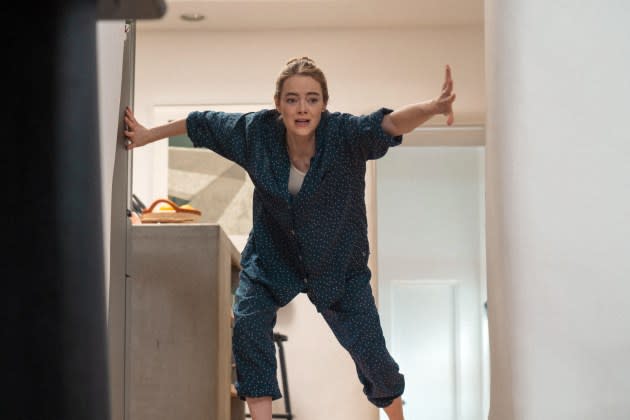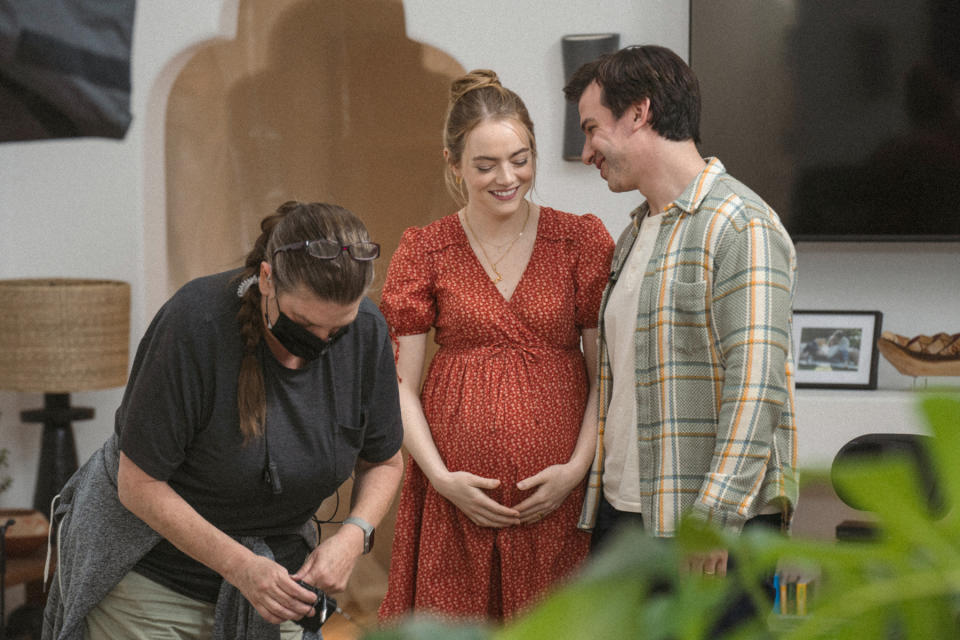‘The Curse’ Finale Is Bonkers and Deeply Frustrating
- Oops!Something went wrong.Please try again later.
- Oops!Something went wrong.Please try again later.
- Oops!Something went wrong.Please try again later.

This post contains spoilers for the finale of The Curse, which is now streaming on Paramount+ with Showtime.
Early in the concluding episode of The Curse, “Green Queen,” Asher and Whitney’s Shabbat dinner turns into a debate about Cara’s well-publicized decision to quit the art world. Whitney, of course, is envious that Cara is enjoying the kind of media attention that Whitney assumed she would get herself with the HGTV show. Asher tries to be more generous, but he’s in over his head as usual when it comes to talking about more ephemeral matters. He stammers a few times without completing the phrase “art is about …,” then suggests, “Sometimes, you have to go to extreme lengths to make your point.”
More from Rolling Stone
Emma Stone Really, Really Wants to Be a 'Jeopardy!' Contestant
How to Watch 'The Sopranos' Online: Stream the Complete Series Free
The sentiment applies very well to both The Curse in general, and to this bizarre, wildly misconceived finale in particular. Throughout the previous nine episodes, Fielder, Safdie, and Co. went to the most extreme lengths possible to make viewers feel trapped in the Seigel marriage right along with Whitney and Asher. In the process, they made a series that was usually much more fun to talk about than it was to actually watch. But there were highlights along the way, most notably Asher’s response last week to Whitney’s confessional videos about their marriage.
Over these past two and a half months, I’ve repeatedly asked people who have kept watching how they feel about it. The most frequent sentiment has been that they find the whole thing confounding, but trust that Fielder and Safdie were heading somewhere interesting.
“Green Queen” certainly qualifies as interesting. The question is whether it in any way fits with the story that’s been told over the previous nine episodes, and what point the creators are making with a finale in which Asher literally flies off into space and dies, while Whitney gives birth to their child.
Let’s repeat that. The second half of this episode involves Asher waking up to discover that the laws of gravity have reversed on him, and when he makes the mistake of leaving the relative safety of the passive home, he first goes soaring up into a high branch of a nearby tree, then shoots up out of the atmosphere altogether when a firefighter saws off the tree branch, assuming Asher is having a mental health episode and will fall safely onto a pad below.
I’m sorry. I first watched this episode four months ago, and I still need time to process how we got here.
Yes, The Curse has the idea of the supernatural right there in its name. And throughout the season — or, at least, in those episodes where the creative team remembered that Abshir and his daughters existed — there have been hints that Nala’s powers were real. She knew about the chicken vanishing from Asher’s dinner. There was no explanation for how another chicken appeared in the firehouse bathroom. The mean classmate she cursed did fall down and hurt herself later in that school day. And Nala was able to guess the number of nails in Asher’s hand a couple of times before he badly cut himself trying to keep the test going. So it’s not wholly out of nowhere that a big, gigantic, mystical whammy would come calling for Asher at the end here, whether as a result of Dougie cursing him a few episodes back, or Asher promising Whitney last week that, if she still didn’t want to be with him after giving the marriage one more chance, “I would feel it, and I would disappear.” It’s hard to more thoroughly disappear than to literally fall off the face of the earth and wind up frozen in the harsh vacuum of space, right?
Even allowing for all of that … what?
In “Young Hearts,” Asher insists that curses aren’t real, and that all the problems in his marriage have been his own fault. It’s not an entirely accurate sentiment, since Whitney has contributed plenty, starting with her decision to marry a man she clearly doesn’t love, and barely even likes. But the larger idea, about human behavior versus external magic, hit home, and absolutely fit the arguments Fielder and Safdie seemed to be making about the lies we tell ourselves and the damage that does to the world around us. To lean this far in the other direction doesn’t feel like a proper culmination of the story being told, but more like Fielder and Safdie began feeling the claustrophobia of the show just as much as the rest of us did, and decided the only way out of it was to have one half of the central couple literally escape the orbit of the whole damn planet.
In early press for the series, Showtime used the phrase “genre-bending” to describe it. This finale is less like bending than shattering — or, if you prefer, like flying away from the earlier genre, as fast as poor Asher sailed up into the sky. It’s not just that the extreme emphasis on the surreal feels out of keeping with what happened earlier, but that this twist renders most of what came before meaningless. For nine episodes — nine long, deliberately difficult episodes that easily could have gotten their ideas across in far more compressed fashion — The Curse was a show that had a lot to say about many subjects: the unreality of reality TV, gentrification, cultural appropriation, ethical capitalism and hypocrisy, and, most of all, the challenges and compromises of marriage in general, and this deeply dysfunctional one in particular. The finale pretty much tosses all of that out the window, gravity be damned, in favor of the surreality of Asher’s new circumstance, as if the creators either lost interest in all the sociological themes or simply couldn’t find a satisfying way to bring them all to a proper conclusion.

To be fair, “Green Queen” offers some interesting moments prior to Whitney finding her husband lying on the ceiling. A time jump sets us up for the Seigels to theoretically get everything they’ve wanted. The retitled HGTV show is now streaming, and the couple gets to do a virtual appearance on Rachael Ray’s show. Whitney is in the late stages of pregnancy, and the Seigels plan to celebrate the end of a life-changing year by attempting to change Abshir’s life, too, gifting him the Questa Lane house. But none of it goes how they would have dreamed it up. None of their friends or family seem to know how to watch Green Queen. The Rachael Ray appearance is a mortifying slog as the host challenges the premise of the show, then quickly loses interest in them, leaving the Seigels smiling awkwardly on a monitor for what feels like forever, while Rachael focuses on an in-studio guest, Sopranos alum Vincent Pastore, and his new cookbook. (It is arguably the most difficult scene to sit through of the entire series — an achievement from this creative team! — and it’s something of a surprise that Fielder and Safdie didn’t make it last even longer, if not turn the whole finale into a fake Rachael Ray episode.) Abshir in no way acts grateful for the generous gift, and is mainly concerned with getting the Seigels to pay his first year’s property taxes(*). And while Asher is thrilled to be on the verge of parenthood, it’s clear throughout that Whitney continues to feel no joy about any aspect of her life, personal or professional. She’s just plastering on that smile when people are watching, staring blankly when they’re not. Her demeanor is as fake as the Seigels’ commitment to the climate neutrality of Whitney’s passive homes, since they’re planning to make the baby’s room climate-controlled, at least at first.
(*) It’s a completely underwhelming experience for them, and an unfortunately appropriate farewell to Abshir, whose presence on the show never lived up to the potential of hiring Barkhad Abdi in the role. He and Nala existed almost entirely as plot devices, or strangers for the Seigels to react to. Even Cara was granted more inner life over the course of the season.
Asher assumes that his strange new existence on the ceiling is a result of that decision — that putting an AC unit into one room somehow created an air pocket that has turned him upside down. He believes the house is endangering both him and their unborn child, and can’t wait to escape to what he thinks is the safety of the outside. As usual, though, Asher has things exactly backward: Staying in the house was literally the only thing keeping him alive. And for as jarring as the anti-gravity twist is in general, it’s a credit to Nathan Fielder as both actor and director that the sequence where the oblivious firefighter begins sawing off the tree limb — over Asher’s desperate pleas for her to stop — is so harrowing.
But again, how did the previous nine episodes lead us here? What in the world — or out of the world, ultimately — does Asher’s strange fate have to do with the themes or stories the show was dealing with before now? Why craft an ending where the two leads are separated for most of it, and Asher’s story is so surprising and larger-than-life that it’s hard to even pay attention whenever we cut to the hospital to see Whitney going through labor and discovering that she feels real love for her baby? For that matter, why are we meant to believe that seeing her newborn solves all of Whitney’s myriad emotional problems, and gives her the happy ending very much denied to her husband, even though she brought as much misery to the marriage and to the world as him?
Just … why?
While Asher is still zooming through the upper atmosphere, Dougie sits on the ground and sobs, calling this the worst thing he’s ever done. Presumably, he’s thinking of when he cursed Asher, but maybe not, because Dougie is such an elusive, inscrutable character. Clarifying Dougie’s whole deal — and why each of the Seigels was so easily swayed by such an off-putting, antagonistic, palpably gross guy — felt like one of the more important pieces of unfinished business going into the finale. Instead, he remains an enigma, his feeling as ultimately mysterious as the reasons why Benny Safdie and Nathan Fielder decided to end The Curse on this note.
This is now Fielder’s third TV show as creator or co-creator. All three have concluded in unexpected ways, but with varying degrees of success. Nathan for You turned introspective and (mostly) sincere at the end, with Fielder helping an old man track down the women he still believed was the love of his life. It was an instant classic. The blurring of fact and fiction seemed to go awry in The Rehearsal finale, where Fielder’s strange experiment appeared to emotionally scar a little boy, in an episode that soured what had been a bold and hilarious show until then.
And this? Since I first watched “Green Queen” in the fall, I’ve revisited it several times, and thought about it often in between. It’s a credit to the previous episodes, and perhaps to just how unexpected this conclusion was, that I haven’t been able to entirely get it out of my head. Or maybe I just can’t let go of my exasperation that this long, difficult, but at times very rewarding journey somehow led us … here. The Curse definitely goes to extreme lengths at the end, but ones that mostly invite questions about what the point of any of it was.
Best of Rolling Stone

